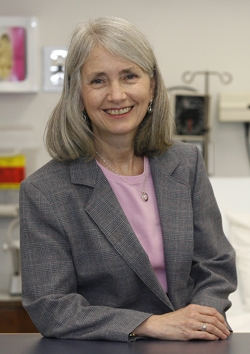Carrying on the legacy of MLK Jr.
Nursing center makes community health a year-long pursuit
Good health is something you can’t put a price on, but quality healthcare is something millions of Americans simply can’t afford. The residents of the Norris Homes public housing project in North Philadelphia know that first-hand. Because of the high cost of care, they often went months or years without visits to doctors or wellness checkups. But that changed when new neighbors arrived.
In 1994, Temple’s Department of Nursing opened Temple Health Connection, a nurse-managed wellness center that provides free healthcare services such as immunizations and well-baby visits to residents of the community. That same year, Congress turned the federal holiday honoring Dr. Martin Luther King Jr. into something more: the King Day of Service, a national day of community service. How fitting that a profession dedicated to advancing quality of life for the underserved honors a preacher who did the same.
As Temple takes part in the citywide King Day of Service on Jan. 19, 2009, Temple Health Connection and the Department of Nursing will extend its community service, by hosting health screenings and youth activities at the Liacouras Center. The events are part of a remembrance organized by Philadelphia-area non-profit organization Global Citizen and hosted by Temple University at the Liacouras Center. The event will launch MLK 365, a program designed to stimulate year-round civic engagement and volunteerism in areas such as literacy, homelessness, poverty, sub-standard housing, bridging the digital divide, the environment, energy and healthcare.
“This is a golden moment for nursing to really do that which it can and contribute to a city environment,” said Frances Ward, Ph.D., R.N., chair, Department of Nursing at Temple’s College of Health Professions. “Our goal is to support the residents and ultimately give better patient care.”
When Temple Health Connection moved in to Norris Homes, no longer did mothers have to board buses with kids in tow to see a doctor. Now, the healthcare they needed was located right where they lived. It’s a convenience that has made a big difference for residents like Diane Gass.
“You’ve got a lot of residents on a fixed income here at Norris, so getting transportation and parking was a big hardship,” said Gass. “Being able to see a nurse in our building — nurses who really cared for the neighborhood — was a blessing.”
Especially for this mother of three. More than 30 years after moving in and raising three daughters, Gass and her girls still call Norris Homes their home. In fact, Gass says, if it weren’t for the nurses, she might not be here today.
“Within two weeks of them opening, I was diagnosed with a bad gallbladder and renegade stone,” said Gass. “I was in the hospital and had it removed. And to think, I’d been seeing a specialist for years who was treating me for an ulcer. Their diagnosis saved my life.”
Gass says she’s seen a change for the better since Temple Health Connection and the nurses arrived. She says the nurses work with the families to meet their needs, instead of dictating what services they’ll give. They provide treatment for sexually transmitted diseases, as well as family planning education for teens. Kids can attend after-school programs and summer camps. When the nurse practitioners encounter a problem they can’t address, they refer to collaborating physicians.
And while nurses in Pennsylvania are licensed to diagnose and treat illnesses, Ward says her nurses are at their best when they’re providing health prevention and promotion. One way to accomplish that goal is through screenings for a variety of illnesses, from high cholesterol and blood pressure to alcoholism and prostate problems. It’s what Ward calls a complete “loop of service.”
“At our upcoming screening, participants will move from station to station and when they finish, we’ll determine if they need further care,” says Ward. “Some will go right to the emergency room and others will only need encouragement to stay as healthy as they are; but the biggest group is those who will need ongoing care. We’ll follow up at Temple Health Connections and if they don’t have a provider, we’ll move them directly into federally qualified health centers or specialty services, like those provided by our School of Medicine.”
As they reach out to the community, embrace diversity and focus on lifestyle choices, the Temple nurse practitioners are pursuing a mission established so many years ago by Dr. King — one that will live on well after the day of community service has ended.

